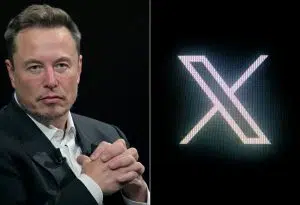Brussels – It was only a matter of days. Now, the clash between the owner of X, Elon Musk, and the Prime Minister of the United Kingdom, Keir Starmer, has crossed the Channel, and something within the European Union is also moving. Because in the fluid world with no real borders of online platforms, what is happening in British cities cannot help but have an impact on the spread of illegal content and misinformation to EU users as well, as highlighted by the feeding of far-right violence in the UK by the South African/US entrepreneur on his platform.

“One would think that Musk, as the owner of a social media platform used and enjoyed by millions of European citizens, has a moral responsibility not to encourage disorder.” reads a sent by the leaders of the liberal Renew Europe group in the European Parliament—President Valérie Hayer and First Vice-President Billy Kelleher—that calls on the EU Commission to take direct action to counter the risk of the harmful effects of the X owner’s attitude spreading to EU territory as well: “If ethics cannot force him, the law must intervene.” After the wave of violent protests that erupted following the killing of three children in Southport (for which migrant people were unfoundedly blamed through the spread of fake news on social networks), Musk continually stoked tensions, attacking PM Starmer, sharing totally false posts (such as one that claimed that those arrested would be sent to detention centres in the Falkland Islands) and claiming that in Europe “civil war is inevitable”.
In light of this evidence, the liberal MEPs wrote to the Executive Vice President for the Digita Age, Margrethe Vestager, and the Commissioner for the Internal Market, Thierry Breton (both of liberal leanings), to express concern about the “continued proliferation of disinformation and information on X, which is probably playing a role in driving political violence in Europe.” Although those on the liberal side are “supporters of the right to freedom of speech,” it is also true that this right “is not a free pass for disinformation,” as also put in black and white by the Digital Services Act, the EU’s law that became fully effective in February this year. Legislation that implicates X as a gatekeeper (large) platform and, among other obligations, requires it to “mitigate risks such as those related to illegal online content, disinformation or election manipulation, adverse effects on civic discourse or public safety.”

More specifically, Hayer and Kelleher link the issue to the “stability of our democracy,” an “urgent matter” that needs additional effort: “We ask the Commission to take every possible immediate action at its disposal to prevent any further destabilisation” but also to “urgently assess the impact of social media platforms on political discourse in Europe.” From the EU executive, after initial hesitations earlier this week that “the Digital Services Act is applicable only on EU territory,” came an initial, more decisive response yesterday (August 8). “We certainly cannot be naïve; the situation in the UK could affect the EU, and we are also closely following X’s response,” Thomas Regnier, the spokesman responsible for the Digital Age, told the press in Brussels. “This could all be taken into consideration in the infringement proceedings we opened against X on disinformation and illegal content,” is the anticipation of the EU Commission spokesman.
The EU vs Musk saga
The saga of a relationship of trust between the European Union and Musk that was never born, ever since the day of the acquisition of Twitter and its rebranding to X, is a long and articulate one. As early as October 2022, Commissioner Breton warned the South African/US entrepreneur that “in Europe, the little bird [then the symbol of Twitter that today has been replaced with an X, ed.] will fly under our rules,” i.e., those provided by the Digital Services Act. Since August 25 of last year, X has been on the list of 19 gatekeeper platforms that must comply with its obligations (failure to do so carries fines of up to 6 per cent of global turnover), but just a few months after the EU executive launched an infringement procedure to assess whether the platform failed to comply with several provisions of the Digital Services Act. Brussels’ preliminary opinion came last July 12, acknowledging that the Musk-owned social network would have already violated European legislation.
In addition to the issue strictly pertaining to the Digital Services Act, as of November 2022, Musk’s company decided prematurely to stop assessing disinformation related to COVID-19, exiting the European reporting program on Big Tech’s responsibility in spreading news related to the pandemic and vaccination campaign. The decision to stop releasing reports on the measures implemented to combat disinformation was defined by the EU Commission Vice-President in charge of the Digital Age, Věra Jourová, as “the path to confrontation” followed by the South African/US tycoon. In this context, the April 2023 decision to no longer label media controlled by authoritarian regimes such as Russia, China, and Iran and propaganda agencies as “state-affiliated media”, as well as the end of the ban on automatic promotion or recommendation to users of their content, raised enormous controversy.
Even earlier, in December 2022, the von der Leyen Cabinet had already threatened sanctions as a result of the arbitrary suspension of accounts of several journalists dealing with technology and who had been highly critical of new owner Musk. Only a month earlier, the same Commission had spoken out against the temporary closure (still ongoing) of the European office in Brussels, particularly about the consequences in implementing the EU Code of Conduct on Disinformation and the new Digital Services Act. Last in chronological order—until the outbreak of tensions in the UK—on October 10 of last year, a harsh exchange between Commissioner Breton and the platform owner was staged right on X: “Dear Mr Musk, following the terrorist attacks carried out by Hamas against Israel, we have had indications that your platform is being used to spread illegal content and disinformation in the EU,” had been the warning from cabinet member von der Leyen. Now, EU institutions might consider whether it is the head of X himself who is promoting the spread of disinformation and illegal content on the social networking platform.
English version by the Translation Service of Withub





